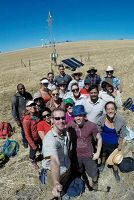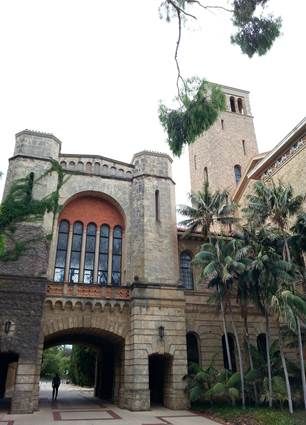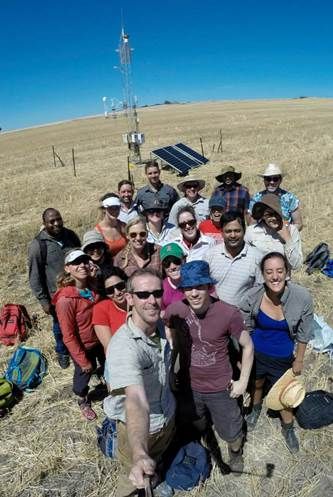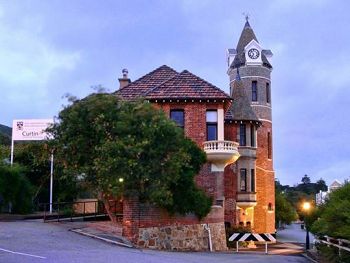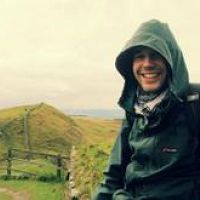Two LCZO PhD students report back from the University of Western Australia Summer School.
Two PhD students studying at the Luquillo Critical Zone Observatory Participated in this year’s University of Western Australia (UWA) Summer School in Perth and at the UWA Future Farm, the site of Australia’s First CZO. Maya Almaraz, who studies nitrogen cycling, at Brown University and Oliver Moore of the University of Bristol who studies trace-metal interactions on mineral surfaces attended and each wrote a report presented below.
Investigating Critical Zone Hotspots in the Hot Sun: WUN Soil Science and Climate Change Summer School
By Oliver Moore, University of Bristol
It certainly didn’t feel like it would be a “summer” school as I left the northern hemisphere in February, but definitely felt like summer when I arrived in the southern hemisphere! I landed at Perth tired after a long journey from the UK, but with a great deal of excitement for the Inaugural WUN Summer School (www.wun.ac.uk). I, along with 19 others from a range of disciplines related to soil science, had been selected to attend the Summer School comprising of a Critical Zone Soil Science and Climate Change field excursion, followed by a writing retreat.
On the first day we received talks from John Hearn, the CEO of the Worldwide Universities Network, as well as leading scientists from the University of Western Australia (UWA). Following this was a tour of UWA’s beautiful campus, including a breath-taking (I mean this in more than one sense, due to the number of stairs!) trip to the top of Winthrop Hall’s clock tower (picture 1).
The following day we left for a five-day excursion to the UWA’s Future Farm, located 158km southeast of Perth. The Farm’s remit is to work with the agricultural industry to develop more sustainable methods of farming, utilising cutting-edge science. Also as Australia’s first Critical Zone Observatory (www.czen.org/content/uwa-czo-avon-river-catchment) the farm possesses a great deal of infrastructure, including a newly installed flux tower (background of picture 2) to help answer the overarching questions of the CZO network.
Picture 2: WUN Soil Summer School participants, at the UWA farm flux tower. Photo Courtesy of David Huber.
The objective of the trip to the farm was to study the laterite deposits in the area, a fairly unique formation globally, and to study it’s coupling with the local biota. Developing an approach to this question was a fantastic learning experience in itself with students from so many different disciplines contributing. During our stay at the farm, various leading scientists from UWA visited, bringing their expertise and equipment to help us study the area, interspersed with lunchtime talks about their own research. This lead to a fascinating experience and allowed me to use and/or observe techniques that I had previously not (e.g. UAV surveying and geophysical surveying).
After we returned from the farm we spent a day in the lab to analyse our soil samples, then it was off to the UWA’s centre in Albany. During a student’s PhD, there are few occasions where they are afforded the time to spend four days just writing. However, writing was the key objective of the final part of the WUN Soil Summer School. With regular workshops based on creative writing techniques, access to an editor of a leading soil journal as well as highly experienced academics, led to a very positive environment in which to write. It was then a sad departure from the writing retreat, concluding the end of a fantastic trip.
Picture 3: Writing retreat at UWA’s Albany centre. Photo taken from: www.volunteering.guild.uwa.edu.au/albany
Upon reflection back at the University of Bristol, I have gotten so much out of the Soil Summer School, not only for the near future, in terms of my PhD but also for the connections and potential collaborations I have made that will last for the entirety of my career. I therefore am extremely grateful to the WUN for its funding, with a special thank you to Susan Jim (WUN Network Development Manager, Bristol). A thank you is also owed for the hard work and dedication of the staff at the UWA, especially Matthias Leopold, Deidre Gleeson, Judith Berman and Krystyna Haq, who developed and ran this trip. I sincerely hope that the WUN Soil Summer School will continue to be funded so that other early career researchers can benefit as I have.
University of Western Australia Summer School Trip Report
Maya Almaraz
The University of Western Australia Summer School program was an excellent experience that proved advantageous to my professional development. The program was well facilitated and exposed me to a number of new field and laboratory techniques. Expertise from facilitators and peers broadened my understanding of not only my own field, but those peripheral to mine. Perhaps most importantly, were the professional relationships I established with peers and UWA staff, with whom I plan to pursue future research collaborations.
Exposure to the ecology, geology, and farming practices of Western Australia is an opportunity I wouldn’t have otherwise had if not for this course. As a tropical ecologist, I have not had much exposure to semi-arid ecosystems, however I was impressed to learn how many ways in which they parallel highly weathered tropical soils. Learning about this ecosystem helped me to gain a better understanding of the ecosystems in which I ordinarily work. Having worked in agricultural systems, both in the tropics and the temperate zone, I found it incredibly interesting to hear about how farming differs in a dry, nutrient poor, highly weathered ecosystem. I was able to draw on my own research and experiences in agriculture to ask questions about the interaction between agricultural practices and biogeochemical cycling specific to Western Australia.
In addition to learning about a new ecosystem, I also gained experience in laboratory and field methods in tangential fields. My advisor is a geologist by training and our lab’s work focuses a lot on the confluence between biogeochemical cycling and geomorphology, particularly at the Luquillo CZO, where my dissertation research takes place. Without a traditional background in geology, I found it extremely beneficial to gain exposure to geologic techniques, theory, and even scientific fundamentals throughout this program. Perhaps most exciting, was the opportunity to learn laboratory techniques for DNA extractions and sequencing. As a biogeochemist with a focus in nitrogen cycling, for which the majority of transformations are microbially mediated, I collaborate with microbial ecologist who perform DNA sequencing. Hands on practice with this technique, and eventual exposure to working with the data, not only builds my understanding of the methodology and interpreting data that I can apply to my own research, but will better equip me for reviewing manuscripts that include microbial sequencing in the future.
What struck me as unique in this short course was the benefit I gained from participating in a program with peers also towards the end of their PhDs. The level and breadth of expertise in the group, not only from the wide ranging specialties of the staff but also that of the students, deepened my learning experience by creating learning opportunities during every interaction over the two week course. I found this true not only of scientific knowledge, but also in the professional advising I gained from peers at a similar point in their academic careers. The group possessed a wealth of knowledge and remarkable enthusiasm that made the course standout amongst other short courses I have participated in.
Networking opportunities such as these are unique and important. Establishing a network of professional scientific relationships benefits all researchers, but is perhaps especially important to early career scientists. However, it is early career scientists who are perhaps most impeded in their exposure to scientists outside their own lab or department. Making genuine professional relationships and learning something about your ability to collaborate with peers is immensely important, but can sometimes be overlooked when it comes to training graduate students. The bonding experiences that coincide with collecting data, reviewing writing and living with other graduate students, even for a short period of time, has great potential for forging lasting professional relationships.
There were two outcomes from the WUN summer school that directly impacted my professional development: 1) the connections I established with other scientists, with whom I plan to write a proposal, and 2) a newfound perspective on a potential post-doc location.
In collaboration with another WUN student, it is our plan to pursue an ARC proposal based on the presentation made my Louise Barton. Fellow UWA student, David Huber, and I both share interests in nitrogen cycling, land use and climate change. As part of the summer school, Louise Barton gave a talk covering her research on N2O emissions from agriculture in Western Australia, and how her results in these nutrient poor soils reduced Australia’s international emission factor for N2O from 1% to 0.1% (of assumed fertilizer loss as N2O). We learned during this talk that Louise had not yet measured NOx or N2 emissions, but was highly interested in them. Since David Huber and I both specialize in gaseous N emissions, it is our plan to approach members of the UWA faculty about writing a proposal to look at these unmeasured gaseous losses and how they vary with climate.
Finally, my dissertation research in denitrification and N2 production has peaked my interest in pursuing post-doc opportunities at Monash University in Melbourne Australia. The lab of interest looks at denitrification to N2, but in aquatic systems rather than terrestrial ones. Pursuing a post-doc in aquatic ecosystems would expose me to denitrification techniques that differ from the soil measurements I focused on during my PhD. Experience in aquatic ecosystems would also familiarize me with a broader sector of the scientific literature on denitrification, and to different microbial processes that might be applied to aquatic systems; in fact several new discoveries regarding soil nitrogen transformations are based off of our understanding of aquatic systems. A post-doctoral opportunity would expose me to new methodological techniques in a new system. Prior to visiting Australia I was still unsure whether such a move would be agreeable with me, but now I am confident that I could be very happy living in Australia for a post-doctoral position.
The UWA summer school had both indirect and direct benefits to my progress as a graduate student. The relationships I built with staff and peers, and exposure to new techniques and concepts, will surely strengthen my success as a biogeochemist. My future research plans, to write an ARC proposal, and apply to post-doctoral positions in Australia have placed a new ecological research location on my agenda. I had a wonderful time at the UWA summer school and I am thankful for the opportunity to participate. The benefits I reaped from participating in this course make it one that I hope will continue and that I will definitely recommend to other graduate students in the future.
Picture 1: Winthrop Hall’s Clock Tower, UWA Campus.
Picture 2: WUN Soil Summer School participants, at the UWA farm flux tower. Photo Courtesy of David Huber.
Picture 3: Writing retreat at UWA’s Albany centre. Photo taken from: www.volunteering.guild.uwa.edu.au/albany
News Category:
RESEARCH |
PEOPLE |
EDUCATION/OUTREACH
Explore Further
